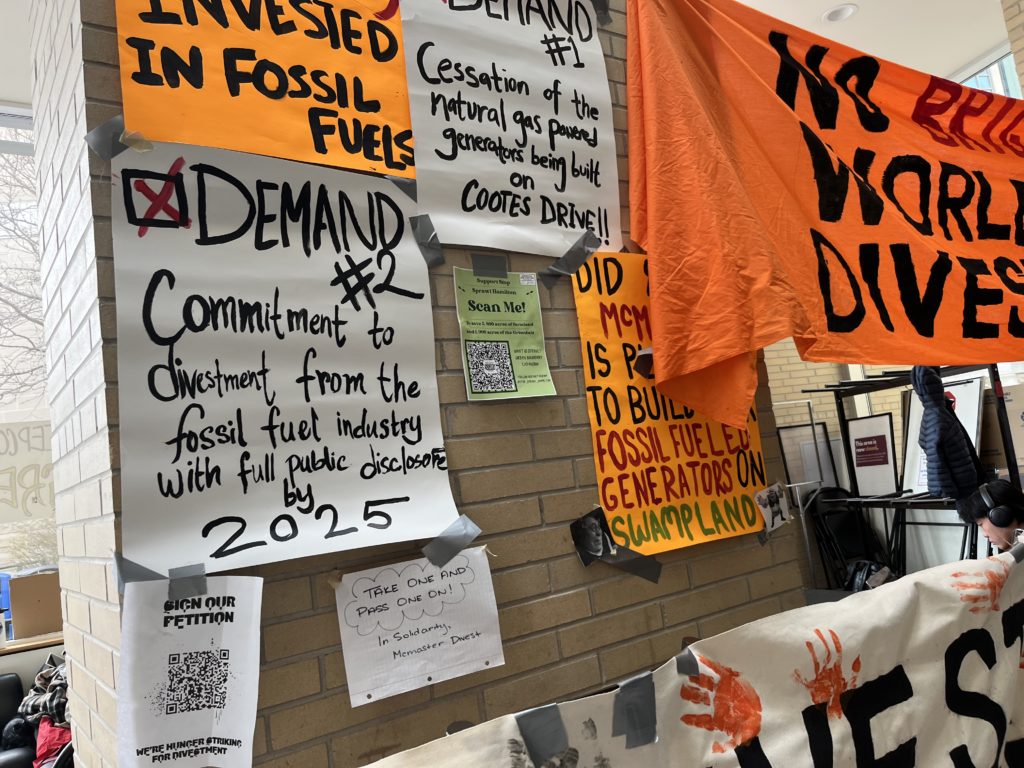A breakdown of the MacDivest hunger strike and its demands
The eight day MacDivest hunger strike advocated for removal of the gas-powered generators on Cootes Drive and commitment to total divestment by 2025
The MacDivest hunger strike, which has garnered national media attention over its eightday duration, came to an end on Mar. 27.
In the article below, the Silhouette aims to provide a comprehensive overview of the key issues surrounding the MacDivest hunger strike and its impact on students.
The hunger strike
On Mar. 8, MacDivest announced that six students would be commencing a hunger strike as of Mar. 20, to pressure McMaster to cancel the Cootes generator project and commit to total divestment. In the lead-up to the start date of the strike, MacDivest representatives met with the university on multiple occasions.

The two parties were not able to come to an agreement, and, as of Mar. 20, five students associated with MacDivest officially began hunger striking. The strike began with a rally, featuring speeches from local activists and students.
The Silhouette attended this rally and spoke to students about their decision to strike.
Sydney Szijarto, a MacDivest representative and hunger striker, stated that McMaster has a responsibility to its students to protect their futures from the climate crisis.
“I chose McMaster, I am paying a fair bit of money to McMaster and contributing to the community, and I feel like that gives McMaster a responsibility to me — to hear what I have to say and to protect my future. I also feel like it gives me the responsibility to push McMaster towards being better and to being fossil free,” explained Szijarto.
I chose McMaster, I am paying a fair bit of money to McMaster and contributing to the community, and I feel like that gives McMaster a responsibility to me — to hear what I have to say and to protect my future. I also feel like it gives me the responsibility to push McMaster towards being better and to being fossil free.
Sydney Szijarto, MacDivest hunger striker
In the few days that followed the rally, two of the five students withdrew from the strike for health reasons and one other student joined midway through. On Mar. 24, McMaster Divest held a second rally to reiterate the demands of the strike and highlight that the three original strikers had now reached 100 hours without food.

This rally was attended by numerous students and local activists, including Sarah Jama, member of provincial parliament for Hamilton Centre, and Alex Wilson, Ward 13 city councillor, both of whom expressed support for the striking students.
“Students pay so much money to be here — thousands upon thousands of dollars — and they have a right to say that they don’t want to participate in and put money towards ruining our climate,” said Jama.
Wilson also stated that the students’ decision to hunger strike embodies the harms and the stakes of the climate crisis.
“As one of the strikers even said, this isn’t what they want to be doing, but they’re doing it because they fear we have a future of hunger if we don’t take action,” said Wilson.
Throughout the strike, the MacDivest posted daily video updates on thier Instagram page about the hunger strikers and their experiences. Over the week-long strike, strikers reported feeling dizzy, nauseous, weakened, exhausted and frustrated.
On Mar. 27, the eighth day of the strike, MacDivest made the decision to end the hunger strike, due to the increasingly serious health risks for strikers.
On Mar. 27, the eighth day of the strike, MacDivest made the decision to end the hunger strike, due to the increasingly serious health risks for strikers.
“Despite a week of the hunger strike and considerable notice prior to, we still hear the same statements from the university administration. In simple terms, they will continue their investments and use their natural gas generators, with their sustainability initiatives as a band aid to the support they provide to the fossil fuel industry,” said MacDivest in their Mar. 27 Instagram post.
In their own Mar. 27 statement, the university discussed MacDivest's decision to end the hunger strike.
"We are pleased that members of MacDivest chose to end their hunger strike as of Monday evening (Mar. 27). We look forward to ongoing conversations with our community," said the university in their Mar. 27 statement.
An overview of peak shaving at McMaster
One of the key demands of the MacDivest hunger strike was to suspend the gas-powered generator project on Cootes Drive. This project, first announced in March 2022, is a peak shaving initiative by the university. The goal of peak shaving is to lower the demand on the provincial electrical grid during select peak dates and times during the year.
In 2010, the province of Ontario introduced the Industrial Conservation Initiative, which offers reduced electricity rates to large electricity consumers who decrease their reliance on the provincial electrical grid during five peak hours throughout the year. Large electricity consumers that opt into this program are known as Class A consumers.
According to the province of Ontario website, one benefit of peak shaving is that, if enough large electricity consumers engage in this practice, the province will not need to build more infrastructure to support the provincial electrical system during peak times. The environmental impact of peak shaving, therefore, is that it can prevent the province from needing to build more gas-powered energy plants.
In the summer of 2014, McMaster Facility Services began their Chasing the Peak Initiative. According to McMaster University’s 2019 Energy Management Plan, peak times for electricity demand typically fall during the summer, when the university operates its cooling plant to regulate temperatures on campus.
During summer 2014, the university held an electricity conservation competition between different buildings on campus, successfully chasing the peak.
From 2014 to 2017, McMaster acted as a Class A electricity consumer and implemented conservation-based peak shaving. This saved McMaster approximately $2 million annually, according to the 2019 Energy Management Plan.
“During its time as a Class A consumer, the campus was successful in reducing its peak during the provincial peaks largely through end user actions under the “Chasing the Peaks” initiative. However, this was viewed as disruptive to campus activities,” reads McMaster’s Net Zero Carbon Roadmap.
During its time as a Class A consumer, the campus was successful in reducing its peak during the provincial peaks largely through end user actions under the “Chasing the Peaks” initiative. However, this was viewed as disruptive to campus activities.
McMaster University Net Zero Carbon Roadmap
In 2017, McMaster installed a gas-powered cogeneration unit to provide the university with an alternate electricity source during peak times, marking the end of their conservation-based peak shaving approach.
According to the Net Zero Carbon Roadmap, this cogeneration unit reduces campus electricity demands during peaks by 35 per cent. The roadmap then states that further generator capacity is required to further reduce demand during provincial peaks. If peak demand is reduced enough, the university can once again pursue Class A rates.
For the purpose of further peak shaving, the university announced last year their plan to build four gas-powered generators on Cootes Drive.
“Clearly, peak shaving in of itself is not a carbon reduction measure. Running the natural gas peak shaving generators plus the cogeneration unit to generate electricity adds to the campus direct emissions,” reads the university’s Net Zero Carbon Roadmap.
Clearly, peak shaving in of itself is not a carbon reduction measure. Running the natural gas peak shaving generators plus the cogeneration unit to generate electricity adds to the campus direct emissions.
McMaster University Net Zero Carbon Roadmap
The City of Hamilton, in the process of approving the generator project, acknowledged this likely increase in emissions as well.
“City staff did express concern [about] the increase of greenhouse gas emissions potential as a result of this type of project and stated it did not meet the objectives or intent of Hamilton City Council’s Climate Emergency Declaration,” stated Lauren Vastano, Communications Officer for the City of Hamilton, in an email to the Silhouette.
However, Vastano explained, the generator project does not contradict any city legislation or policy. Vastano stated that the City of Hamilton is eager to see how McMaster plans to offset the emissions and work towards a greener future.

C/O MacDivest
Adeola Egbeyemi, representative of Environment Hamilton, explained that Environment Hamilton is also concerned about the emissions from the generators.
“On regular days, more mild days like these, [the generators] just stand and do nothing. However, when we get to those peak days, they're designed to quickly fire up in response to those spikes. So, this actually makes them more polluting, compared to cleaner plants, because [the generators use] almost 50 per cent more natural gas to get [to that spike very quickly],” explained Egbeyemi.
Dr. James Quinn, a biology professor at McMaster University who has been involved in campus environmental activism for the past decade, also expressed concerns about the generators. Quinn stated to the Silhouette that green energy projects and peak shaving should not be equated. Quinn also spoke about the viability of conservation as a peak shaving approach.
According to Quinn, when the university last attempted conservation-based peak shaving, people were not given sufficient advanced notice and were therefore upset when the air-conditioning was shut off without warning. As well, Quinn said, the university did not consider the impact on labs and scientific research.
Quinn stated that, if attempted again and approached differently, the conservation approach could be more successful.
McMaster’s roadmap states that this conservation approach was disruptive to campus activities and that the reduced costs associated with peak shaving will have benefits for the university’s climate goals.
“Much of the reduction of [greenhouse gas] emissions on the McMaster campus involves fuel switching from natural gas to electricity as an energy source. In order to achieve this transition without significant increases in utility costs, the campus needs to reduce the electrical rate it pays,” reads the roadmap.
McMaster University has also stated that the money saved from peak shaving initiatives will go towards carbon reduction projects on campus. However, MacDivest representative Navin Garg explained to the Silhouette that, if the generators run for 60 hours per year, they will take 13 years to pay off before they begin generating revenue.
McMaster University has also stated that the money saved from peak shaving initiatives will go towards carbon reduction projects on campus. However, McMaster Divest representative Navin Garg explained to the Silhouette that, if the generators run for 60 hours per year, they will take 13 years to pay off before they begin generating revenue.
In her interview with the Silhouette, Egbeyemi also highlighted that this locks McMaster into over a decade of fossil fuel usage.
At the MacDivest rally on Friday, Peter Cooper, a former project manager at the University of Guelph and a Hamilton 350 affiliate, spoke about the possibility of peak shaving through battery storage of clean energy. Cooper stated that he spoke to a well-known Toronto company and was told that this peak-shaving method is not only greener but potentially more cost-effective as well.
In their Mar. 27 statement about the hunger strike, McMaster University stated that they are looking for ways to reduce the carbon footprint of the generators. They also described the generators as their best option for continuing to provide energy to campus when the provincial electrical grid is nearing its peak.
In an email to the Silhouette, McMaster explained that, although they have looked into batteries and other clean energy sources, they have determined that the gas-powered generators are the most reliable option.
"We recognize that batteries are a commonly proposed solution, however, we explored batteries and other renewable technologies, and the technology is not capable or reliable enough to power all of McMaster’s campus at this point. McMaster has a responsibility to make sure critical infrastructure on campus, such as medical labs, remains operational. We continue, however, to examine and find ways to do it as cleanly as possible," said the university, in an email to the Silhouette on Mar. 30.
Divestment at McMaster
The other key demand of the hunger strike was total divestment from fossil fuels.
The first on-campus group to advocate for divestment was Fossil Free McMaster, founded in 2013. Fossil Free McMaster was active for several years before adopting their current name, McMaster Divest, as of three years ago.
In March 2021, McMaster students engaged in their first climate strike, led by MacDivest and numerous other environmental activist groups on campus, which called for divestment as its primary goal.
Also in March 2021, McMaster University released a statement about their commitment to divestment, saying that President David Farrar had asked the Board of Governors to implement a divestment strategy.
The university has since released accelerated carbon reduction goals, outlined in a Mar. 15 statement.
“The university has committed to reducing the carbon exposure of our investments by 65 per cent by 2025; 75 per cent by 2030 and the rest as soon as possible after that,” reads the statement.
"The university has committed to reducing the carbon exposure of our investments by 65 per cent by 2025; 75 per cent by 2030 and the rest as soon as possible after that."
McMaster University, Mar. 15 statement
Currently, McMaster has 30.4 million dollars invested in the Carbon Underground 200, the largest two hundred owners of carbon reserves. In their recent activism, MacDivest has been calling for total divestment of this 30.4 million by 2025.

In their statement from Mar. 27, McMaster University discussed their goal of 75 per cent reduction by 2030, as it relates to the climate goals of other universities.
“McMaster’s reductions and targets are aggressive and are aligned with or surpass those of other Canadian universities,” reads the statement.
While many Canadian universities have not taken steps towards divestment, others have released divestment timelines more aggressive than McMaster’s. University of Toronto and University of British Columbia have both committed to total divestment from fossil fuels by 2030. Simon Fraser University has committed to total divestment by 2025.
When Garg spoke to the Silhouette earlier this month, they stated that the university does not use its investment portfolio politically. While the Silhouette has not been able to confirm this statement, McMaster’s Social Responsibility and Investing webpage identifies challenges with adopting rigid social or political guidelines for investment as a university, given that universities are large collective bodies that value dissent.
“[I]t would be invidious to presume that any single group could speak for all members of the University community. Such considerations militate against the establishment of inflexible guidelines for defining social policy as they relate to the investment decisions of the Planning and Resources Committee of the University,” states the webpage.
Garg addressed this concern directly in their interview with the Silhouette, emphasizing that MacDivest views divestment from fossil fuels as an environmental imperative rather than a political statement.
The university did not comment when asked whether commitment to divestment would be considered an inflexible guideline for defining investment-related social policy.
MacDivest has created an online petition to pressure the university to divest from fossil fuels. As of publication, the petition has over 1700 signatures.
On Mar. 29, Richard Brooks, Climate Finance Director of activist organization stand.earth, also released an open letter to the university, which was signed by 120 organizations from Canada and internationally. The open letter discusses the urgency of climate change, the importance of climate activism to upholding Indigenous self-determination and the precedent for divestment that has been set by over 1550 institutions worldwide.
"In 2021, the president of the University wrote to the Board of Governors with an explicit directive to develop a strategy for divestment from fossil fuels, and this directive is reflected in the university’s Strategic Plan. Two full years later, the Board has not implemented this directive," states the open letter.
Conclusion
While McMaster University has acknowledged the strike and the importance of student perspectives, the university has not made any further commitments to divestment nor to the cancellation of the generator project.
Although the hunger strike has ended, MacDivest has stated that they remain committed to the demands of the strike and to a fossil-free future for the McMaster community.


